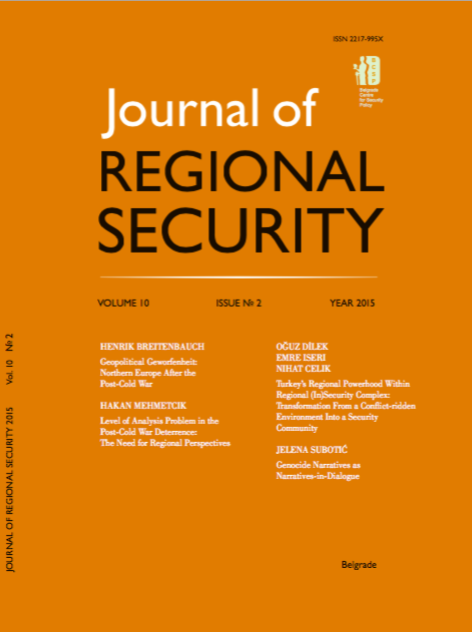Genocide Narratives as Narratives-in-Dialogue
Abstract
This article aims to expand narrative analysis in International Relations (IR) by exploring narratives in mutual dialogue. The purpose is to move narrative analysis away from mostly static approaches that focus on speech or other performative acts, toward a more dynamic approach that focuses on narrative interaction and dialogue. While the logic of what narratives actually do in politics builds on existing work within the IR linguistic turn, I emphasize the process by which the content and rearrangement of narratives depends on their mutual dialogue, which makes narratives co-constitutive of each other. Examples of political narratives – specifically the competing narratives of genocide – in the former Yugoslavia and its successor states illustrate these dynamics. The Yugoslav space offers a great laboratory to examine narratives in dialogue as this is where competing state autobiographies bounced against each other, adapted, and transformed into powerful tales that justified (if not directly produced) state partition and mass atrocity.
Authors retain copyright of the published papers and grant to the publisher the non-exclusive right to publish the article, to be cited as its original publisher in case of reuse, and to distribute it in all forms and media.
The published articles will be distributed under the Creative Commons Attribution 4.0 International License (CC BY). It is allowed to copy and redistribute the material in any medium or format, and remix, transform, and build upon it for any purpose, even commercially, as long as appropriate credit is given to the original author(s), a link to the license is provided and it is indicated if changes were made. / The published articles will be distributed under the Creative Commons Attribution ShareAlike 4.0 International license (CC BY-SA). It is allowed to copy and redistribute the material in any medium or format, and remix, transform, and build upon it for any purpose, even commercially, as long as appropriate credit is given to the original author(s), a link to the license is provided, it is indicated if changes were made and the new work is distributed under the same license as the original.
Users are required to provide full bibliographic description of the original publication (authors, article title, journal title, volume, issue, pages), as well as its DOI code. In electronic publishing, users are also required to link the content with both the original article published in Journal of Regional Security and the licence used.
Authors are able to enter into separate, additional contractual arrangements for the non-exclusive distribution of the journal's published version of the work (e.g., post it to an institutional repository or publish it in a book), with an acknowledgement of its initial publication in this journal.
Authors are permitted to deposit author’s pre-print / author’s post-print (accepted version) / publisher's version (PDF) of their work in an institutional repository, subject-based repository, author's personal website (including social networking sites, such as ResearchGate, Academia.edu, etc.), and/or departmental website prior or during the submission process / at any time after the acceptance of the manuscript / at any time after publication.
Full bibliographic information (authors, article title, journal title, volume, issue, pages) about the original publication must be provided and links must be made to the article's DOI and the license.

